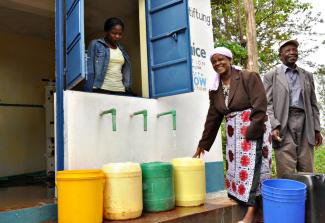Empowerment
A social benefit

Whether it is water filters composting plants, thermal collectors or even information from the internet – technologies ensure the fulfilment of basic needs for people around the world and improve their quality of life. However, experience from working in developing and emerging markets over the decades has shown that it is not much help when there is an attempt to implement “suitable” solutions without involving the people actually using them. With the “empowering people. Award“, the Siemens Stiftung (foundation) has initiated a worldwide competition which does not only aim to identify practicable solutions but also make them available in the areas where they improve welfare and encourage a social entrepreneurship approach.
The benefit of employing social entrepreneurship is that it helps people to help themselves. Profits that are made flow into the extension of the company instead of someone’s private pocket; they improve the salaries for employees and enable, in the best case, further non-profit projects. Therefore their impact goes further than merely providing water, food or electricity. This is how the SkyJuice Foundation in Australia, for example, developed a new water filter which removes harmful bacteria and virus from drinking water by using low-pressure membranes. With the aid of this technology, the Siemens Stiftung together with other partners in Kenya built decentralised water kiosks. They secure access to water even in regions that are remote and are, at the same time, business models with social impact because “local managers” are trained on site and are made familiar with commercial tasks to do with the supply of water.
Highly welcomed autonomy
Projects with social entrepreneurship like the technologies in Kenya are examples of those the Siemens Stiftung would like to highlight with the Award: Beneficiaries enjoy improved basic supply with such projects as dirty water becomes drinkable, because those living in rural areas have access to electricity or because families can be supported with the energy efficient building of houses that are more stable than corrugated iron huts. Technical solutions which are manufactured in factories in the regions themselves and that can be maintained there, also create income possibilities for the population. In this way, modern technology becomes a catalyst for local development.
In addition the financially independent initiatives can trigger further projects in the regions which improve life quality and social structures sustainably. This is precisely how further small companies were created alongside the decentralised water kiosks in Kenya: Today bike couriers are paid to deliver water to customers living in remote areas, and several households in the region have joined together to set up their own small water network which is fed from one of the kiosks. This has resulted in independent citizens which can continue using the structures they have built even when the funds from developmental work have run out.
Usage in a local context
Access to knowledge and the opportunity to share ideas are amongst the most important factors for success in developmental cooperation. This also applies to exchanging examples of best practice: Similar questions are asked in almost all areas of basic supply. Many attempts at self-help fail precisely when a solution is in sight which others have found already. This costs time and money.
With the “empowering people. Award“, a platform is to be created which brings together the most important actors: On one hand there are the bright heads who can offer technical solutions, on the other are people who live in terrible conditions and with insufficient supply of their basic needs. Numerous organisations try and bring together both sides, often with
a small amount of funds.
This is why the Award is more than a competition. The entries submitted are to later create a knowledge database which can be accessed by everyone. It encourages the exchange of knowledge and enables new cooperation. Practitioners from developmental work can research online in the regions so that they can implement the technologies available in their projects.
The creators also hope to enable direct interaction between the public and private sphere as well as the academic world: Successful and proven ideas are also attractive to international partners and investors. The competition is supported by experienced partners such as the KfW (business area development bank), UN Habitat, the Helmholtz Association and the AT Association.
Technology is a lever for social development on all levels. This applies to large scale programmes which ensure innovation with high financial capital but also to small, simple technologies which only need few resources and can work under tough conditions. But large or small, the same rule applies: In order to combine technologies with social benefit, their social and financial opportunities have to be recognised first.







